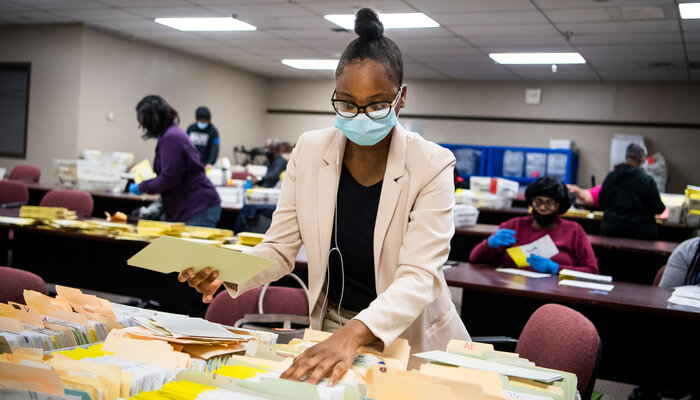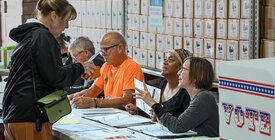
Poll of Local Election Officials Finds Safety Fears for Colleagues — and Themselves
Officials report threats and a need for more support at the federal and local levels, and it’s causing many to leave their jobs.

Part of
As American democracy finds itself under assault from lies about the 2020 presidential race being “stolen,” election officials are a prime target in the attempt to undermine future elections. In 2020, in the face of a pandemic, record-high turnout, and a flood of disinformation about the election process and its integrity, these officials managed to run “the most secure election in American history.”
But now, a new Brennan Center poll of local election officials around the country shows how damaging the sustained attacks against them and their colleagues have been, putting apolitical election administration and our democratic system in serious danger. Here are some key findings from the survey.
Election officials are facing threats, and safety concerns are in part why some have left their jobs.
One in six election officials have experienced threats because of their job, and 77 percent say that they feel these threats have increased in recent years. Ranging from death threats that name officials’ young children to racist and gendered harassment, these attacks have forced election officials across the country to take steps like hiring personal security, fleeing their homes, and putting their children into counseling.
As election workers attempt to keep our democracy afloat amidst these conditions, over half of poll respondents reported that they are concerned about the safety of their colleagues. More than one in four are concerned about being assaulted on the job.

Understandably, some election workers have decided these threats are too high a risk: 30 percent of the officials in our poll know of one or more election workers who have left at least in part because of fear for their safety, increased threats, or intimidation. In the long term, 60 percent of officials are concerned that threats, harassment, and intimidation against local election officials will make it difficult to retain and recruit election workers. Election officials and staff have a heavy workload with a slew of tasks that must be regularly undertaken and expertise that must be developed — combined with limited staff and resources. Recruiting and retention challenges would further burden these offices.
Most election officials like their jobs, with three in four agreeing that they find “real enjoyment” in their roles. However, 20 percent plan to leave before the 2024 election, with one-third of those citing political leaders’ attacks on a system they know is fair and honest as one of their top reasons for leaving. And nearly one-third cite unnecessary stress as one of their top reasons for leaving.
Election officials fear that conspiracy theories will infect administration and are worried about political interference.
As conspiracy theories continue to grip a significant portion of the electorate, over half of election officials are concerned that some incoming election officials might believe there was widespread voter fraud during the 2020 elections.
As election officials work hard to repeat the successes of the 2020 election, nearly two-thirds of them reported being worried about political leaders interfering in how they do their jobs in future elections. Since the 2020 vote, partisan actors have interfered with apolitical election administration as part of the broader election sabotage movement. For example, states have passed laws that allow partisans to seize control of election administration and criminally punish election officials for minor infractions.
Further, nearly one in five local election officials are concerned about facing pressure to certify election results in favor of a specific candidate or party.
Election officials are particularly unhappy with support provided by the federal government.
Nearly 80 percent of election officials think the federal government is either doing nothing to support them or taking some steps but not doing enough. While Congress has provided cash-strapped state and local election offices with some support in recent years, that has represented a fraction of what is needed. Although they feel the most support at the local level, nearly a third of local election officials still feel that their local government could be doing more to support them.
The poll also shows that the Justice Department’s Election Threats Task Force, which investigates and prosecutes threats against election officials, has work to do when it comes to reaching election officials and local law enforcement. Ninety percent of election officials never heard of or didn’t know much about the task force. After hearing about it, 57 percent were somewhat or very confident that it would make them feel safer.

It’s clear that the Department of Justice should conduct more outreach to local election officials. It should also increase coordination with local law enforcement, who receive the majority of threat reports, according to our poll. Only a fraction of local election officials who have been threatened because of their job reported the threat to law enforcement, but 89 percent of those who did reported it to local law enforcement.
Social media is seen as a major contributor to problems.
Over three in four local election officials think that social media companies haven’t done enough to stop the spread of false information, and over one in three of those who experienced threats have been threatened over social media.
Answering questions from voters who have been misled by inaccurate election information can be overwhelming and time-consuming, straining election officials and their staff. Social media companies should do more to promote accurate information over false information and work directly with election officials to address pressing concerns.
• • •
These poll results should raise the alarm for anyone who cares about professional, apolitical election administration, especially because they’re coming from the people who know it best. All levels of government must act to protect our elections and the people who run them.
More from the Local Election Official Surveys series
-
Local Election Officials Survey — March 2022
Nearly one in three local election officials know at least one election worker who has left the job, partly due to safety concerns, increased threats, or intimidation. -
Local Election Officials Survey — June 2021
A poll conducted by the Benenson Strategy Group found that one in three local election officials are concerned about facing harassment or pressure while on the job and feel unsafe. -
Survey Finds Election Officials Want More Support Amid Federal Cutbacks and Ongoing Threats
Local election officials are concerned about the loss of federal support for election security and hope state and local governments will step in to fill the void.




